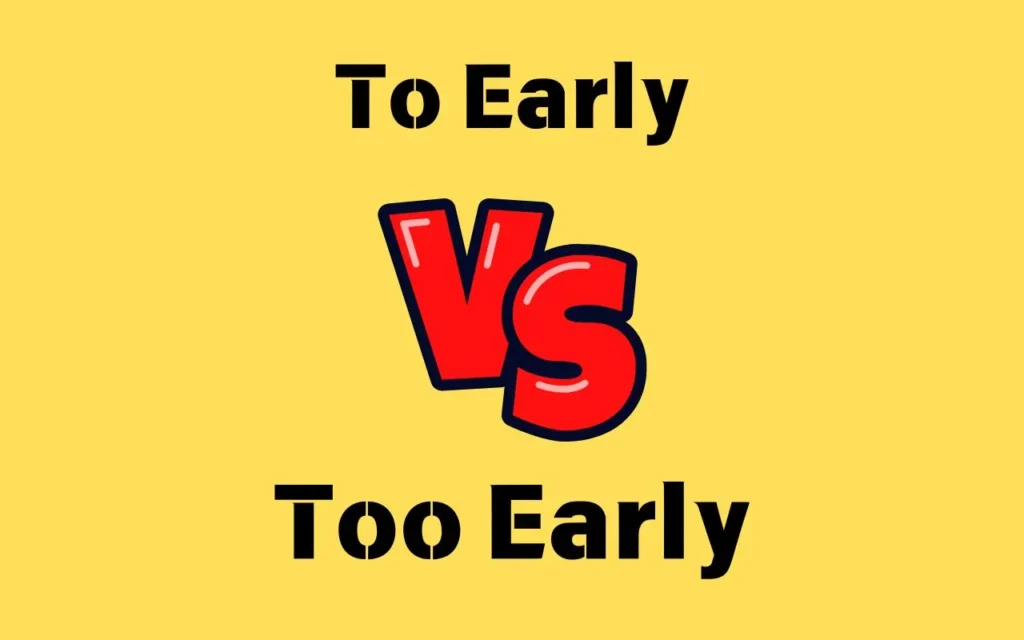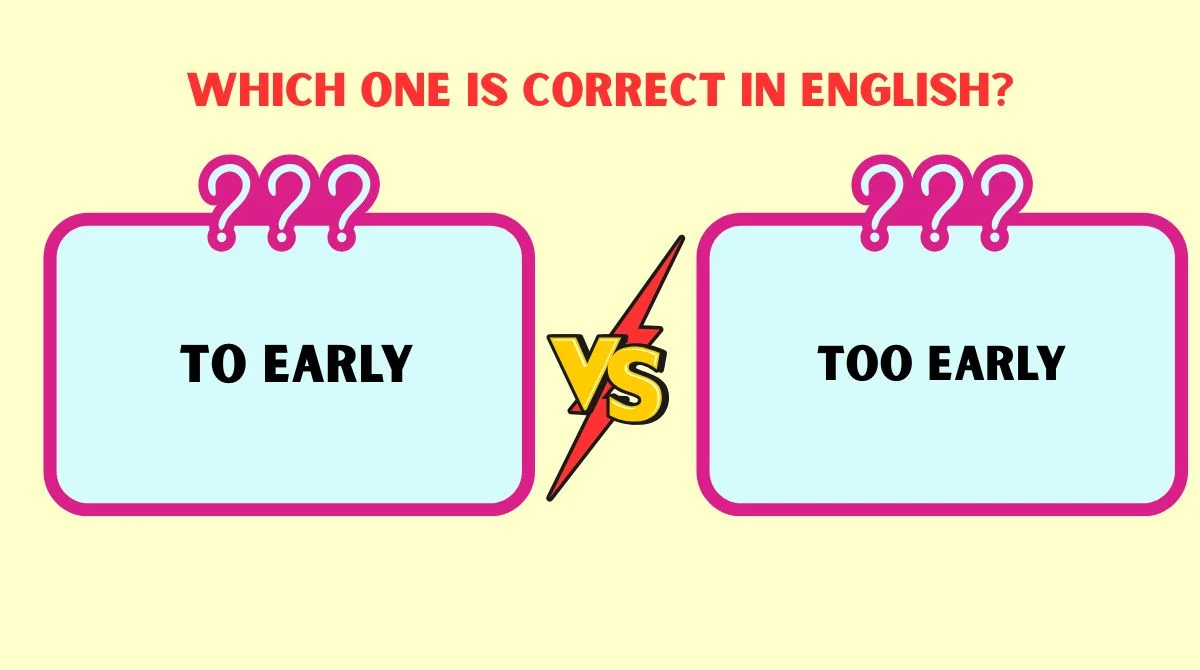Last updated on September 26th, 2025 at 03:14 pm
English can be tricky. Small words like “to” and “too” look alike, sound alike, and often confuse even fluent speakers.
One of the most common slip-ups is writing “to early” instead of “too early.” At first glance, it may not seem like a big deal, but in grammar and communication, these little details matter a lot.
So, is it to or too early? The short answer is: it’s almost always “too early.” But to understand why, let’s dig deeper into the meaning, usage, and rules behind these words.
Why “To” vs. “Too” Causes Confusion

Both words are pronounced the same, which naturally creates mix-ups in writing. Add to that the fact that texting, fast typing, and autocorrect errors creep into our daily lives, and suddenly you’ll see “to early” plastered all over social media posts, emails, and even advertisements.
The confusion boils down to two things:
- Homophones: Words that sound the same but differ in meaning or spelling.
- Context dependency: The correct choice depends on the role of the word in a sentence.
When you rely only on how words sound, “to early” feels fine. But when you look at grammar rules, the story changes.
What “To” Really Means
“To” is one of the most versatile words in English. Primarily, it acts as a preposition that shows:
- Direction: I’m going to the park.
- Recipient: She gave the book to him.
- Purpose/Infinitive marker: I want to learn French.
Notice something? In every example, “to” connects one element to another. It creates relationships, shows direction, or introduces an action.
Now, let’s test it with “early”:
❌ I woke up to early.
This doesn’t work, because “early” is an adjective/adverb, not something you can “go to” or “give to.”
That’s why “to early” doesn’t fit standard grammar rules.
The Power of “Too” as an Intensifier
“Too” has an entirely different role. It acts as an adverb, often used as an intensifier. Its meanings include:
- Excessively / more than enough: It’s too hot outside.
- Also: I want to go too.
When we pair “too” with “early,” it naturally conveys the idea of excessive earliness — earlier than expected, necessary, or appropriate.
Examples:
- We arrived too early for the concert, and the gates were still closed.
- Calling someone at 5 a.m. is too early unless it’s an emergency.
Here, “too” modifies “early” and makes logical sense.
Breaking Down the Phrase “Too Early”
At its core, “too early” means before the right time. But it shows up in both literal and figurative ways.
Literal meaning
- The shop was too early to open at 6 a.m.
- It’s too early in the season for strawberries.
Figurative meaning
- It’s too early to judge the outcome of the project.
- Some say it’s too early to fall in love, but feelings don’t follow a schedule.
In both senses, “too early” expresses a mismatch between time and appropriateness.
Why “To Early” Is Incorrect in Standard Grammar
The phrase “to early” is considered a grammatical mistake. Here’s why:
- “To” cannot directly modify an adjective or adverb.
- “Early” doesn’t fit as the object of “to.”
Think of it this way: you wouldn’t say “to tall” or “to hot” either. The same rule applies here.
Common slip-ups include:
- Social media captions (“It’s to early for this!”).
- Quick texts (“Sorry I’m to early”).
- Ads or headlines with rushed editing.
These aren’t just minor typos — they change the grammatical integrity of your writing.
Practical Examples: To vs. Too with “Early”
To see the difference clearly, let’s put examples side by side:
| Incorrect (To Early) | Correct (Too Early) |
|---|---|
| We arrived to early for class. | We arrived too early for class. |
| It’s to early to tell who’ll win. | It’s too early to tell who’ll win. |
| She called me to early in the morning. | She called me too early in the morning. |
The table shows how one extra “o” completely changes correctness.
Tips for Remembering the Difference
Learning grammar hacks can make “to” vs. “too” second nature. Try these:
- Think of the extra “o.” “Too” means an extra amount. Extra “o” = extra meaning.
- Ask: does it mean “also” or “excessively”? If yes, use “too.”
- Test substitution. Replace “too” with “very.” If the sentence still makes sense, “too” is correct.
- Example: It’s very early ✅ matches It’s too early.
Advanced Cases: When “To” and “Too” Appear Near Each Other
Here’s where it gets interesting. Sometimes, both words appear in the same sentence:
- I went to bed too early.
- He moved to the city too early in his career.
Notice how “to” serves its role as a preposition, while “too” modifies “early.” This is perfectly correct, though visually it can trick the eye.
Insights from Grammar Experts and Style Guides
According to Merriam-Webster, “too” is defined as “to a degree exceeding what is desirable, fitting, or right.” This lines up directly with “too early.”
The Cambridge English Dictionary explains “too” as “more than is allowed, necessary, possible, or acceptable.” Again, this fits.
Style authorities like the Chicago Manual of Style also emphasize clarity: in professional writing, “too early” is correct, while “to early” should be avoided at all costs.
Quick Reference Table: “To” vs. “Too” with Examples
Here’s a handy cheat sheet:
| Word | Function | Example | Wrong Use |
|---|---|---|---|
| To | Preposition (direction, purpose, recipient) | I went to the park. | It’s to early. |
| Too | Adverb (excess, also) | It’s too early to call. | N/A |
Keep this table in mind, especially if you’re prone to typos.
Common Mistakes and How to Avoid Them
People often make the “to early” mistake due to:
- Rushed writing: Texting or typing quickly.
- Overreliance on sound: Since they’re homophones, people default to the wrong spelling.
- Autocorrect mishaps: Phones sometimes “correct” incorrectly.
How to avoid the slip-up:
- Slow down when writing important texts or emails.
- Proofread for common homophone errors.
- Use grammar-check tools like Grammarly or Hemingway Editor.
Summary and Final Thoughts
The phrase “too early” is the correct and accepted form, while “to early” is simply incorrect. Remember:
- “To” = direction, relation, purpose.
- “Too” = excess or also.
- “Too early” = earlier than necessary, right, or expected.
Even though it’s a small difference, mastering it improves both your grammar and credibility in writing.
🙋 FAQs
What is the correct phrase: “to early” or “too early”?
The correct phrase is “too early.” “To early” is always grammatically incorrect.
Why is “too early” correct in English grammar?
“Too” means excessively or more than necessary, which makes sense with “early.” That’s why “too early” works while “to early” doesn’t.
Can “to” ever be used before “early”?
No, “to early” isn’t valid in English. “To” doesn’t modify adjectives like “early.”
How can I remember the difference between “to” and “too”?
Think of the extra “o” in “too” as meaning “extra” or “excess.” That’s the quick memory trick.
Are “to” and “too” homophones?
Yes. They sound the same, which is why people often confuse them in writing.
Is it “too early to tell” or “to early to tell”?
The correct phrase is “too early to tell.” It means it’s premature to know the outcome.
Conclusion
So, is it to or too early? The answer is clear: it’s always “too early.” That single extra “o” makes all the difference between a mistake and proper English.
Language thrives on clarity, and choosing the right word — even when it’s just two letters long — ensures your message comes across sharp, professional, and confident. Next time you’re tempted to write “to early,” stop and remember: extra “o,” extra correctness.
